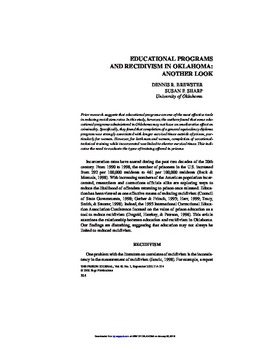| dc.contributor.author | Dennis R. Brewster | |
| dc.contributor.author | Susan F. Sharp | |
| dc.date.accessioned | 2016-01-14T19:52:46Z | |
| dc.date.accessioned | 2016-03-30T15:33:28Z | |
| dc.date.available | 2016-01-14T19:52:46Z | |
| dc.date.available | 2016-03-30T15:33:28Z | |
| dc.date.issued | 2002-09-01 | |
| dc.identifier.citation | Brewster, D. R., & Sharp, S. F. (2002). Educational Programs and Recidivism in Oklahoma: Another Look. The Prison Journal, 82(3), 314-334. doi: 10.1177/003288550208200302 | en_US |
| dc.identifier.uri | https://hdl.handle.net/11244/24888 | |
| dc.description.abstract | Prior research suggests that educational programs are one of the most effective tools in reducing recidivism rates. In this study, however, the authors found that some educational programs administered in Oklahoma may not have an ameliorative effect on criminality. Specifically, they found that completion of a general equivalency diploma program was strongly associated with longer survival times outside of prison, particularly for women. However, for both men and women, completion of vocational-technical training while incarcerated was linked to shorter survival times. This indicates the need to evaluate the types of training offered in prisons. | en_US |
| dc.language.iso | en_US | en_US |
| dc.publisher | The Prison Journal | |
| dc.title | Educational Programs and Recidivism in Oklahoma: Another Look | en_US |
| dc.type | Research Article | en_US |
| dc.description.peerreview | Yes | en_US |
| dc.description.peerreviewnotes | https://us.sagepub.com/en-us/nam/manuscript-submission-guidelines | en_US |
| dc.identifier.doi | 10.1177/003288550208200302 | en_US |
| dc.rights.requestable | false | en_US |
